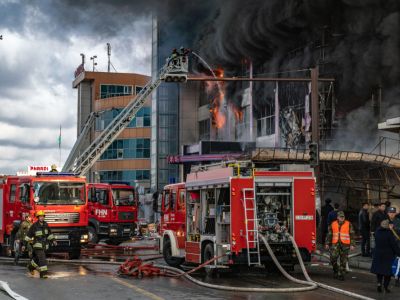World financial markets began to slightly recover Wednesday with commodity and currency prices stabilizing and overseas banks pledging support a day after a terrorist attack struck the heart of Manhattan's financial district, the World Trade Center.
But economists are concerned that the attacks could tip an already precarious US economy into a full-scale recession if consumers stop spending and companies incur significantly higher business costs associated with insurance claims, tighter security measures and potentially higher oil prices, reported the CNN financial network (CNNfn).
The chairman of the Securities and Exchange Commission expects US financial markets to reopen Thursday after the terrorist attack halted trading for the last two days.
Harvey L. Pitt, the SEC chief, told CNN and other news media that he believes trading will resume two days after the New York Stock Exchange halted operation for the first two-day stretch since the end of World War II.
An official announcement about when trading would resume was expected later in the day.
The network said that staff reporters of the Wall Street Journal, whose offices were based at the World Financial Center, were working from their homes and most editors were putting the paper together at the publication's South Brunswick, N.J.
World markets, meanwhile, showed early signs of stabilizing. Oil and gold prices declined in European trading Wednesday after spiking on Tuesday, and the dollar regained strength after tumbling as much as 3 percent Tuesday. However, markets in Mexico, Argentina and Canada remained closed for damage assessment, officials said.
European shares had opened sharply weaker on Wednesday, following losses on Asian markets, the BBC said.
But stock prices rebounded amid hopes that central banks in the US and Europe may cut interest rates to help revive economic confidence.
Sentiment was also supported by pledges by major central banks, including the European Central Bank and the US Federal Reserve, that they will provide sufficient "liquidity" to keep the world economy going.
The banks hope that this will provide companies and governments with enough cheap credit to keep functioning and investing, so helping to stave off the threat of global recession.
"There are many financial companies who may have experienced difficulties as a consequence of events in America and the central banks are pledged to bail out many of the clearing commercial banks," Jeremy Batstone of NatWest stockbrokers told the BBC's World Business Report..
The talk also helped revive the dollar, which fell steeply following Tuesday's terrorist strikes.
In late afternoon dealing in London on Wednesday, one euro was worth $0.9062, compared with $0.9149 in morning trade.
The prices of bonds, oil and gold, which surged on Tuesday, fell back amid a sense of returning calm.
"What can you say? This is a terrible thing to happen but the market must retain some semblance of order," said Rhona O'Connell, market analysis manager at the World Gold Council.
Although US exchanges remained closed, senior financial figures stressed the need to maintain trading on markets elsewhere.
"It may be difficult - one's heart may not be in it - but the fact of the matter is that financial markets are open globally 24 hours a day and they have to continue as best as possible," Mr Batstone said.
London and Irish stock exchanges at 1245 GMT held an minute's silence in honor of the victims of Tuesday's terrorist attacks.
Earlier, Asian stock markets had closed sharply lower.
In Tokyo, where authorities cut in half the limits on daily price movements, the Nikkei index fell 6.6 percent to fresh 17-year lows.
The index closed at 9,610 points, falling below the psychologically important 10,000 points mark for the first time since 1984.
In Hong Kong, the main share index dived by more than 10 percent before recovering slightly.
Trading was also delayed in Korea - by three hours - and promptly suspended when the benchmark index fell 12.2 percent.
China's normally well-insulated Shanghai B share market opened 6.3 percent lower, while in Singapore the Straits Times index was down 8.6 percent.
Investors followed the trend set in European markets on Tuesday, with money moving from shares into the safe havens of bonds and commodities, chiefly oil and gold, said the BBC – Albawaba.com
© 2001 Al Bawaba (www.albawaba.com)









